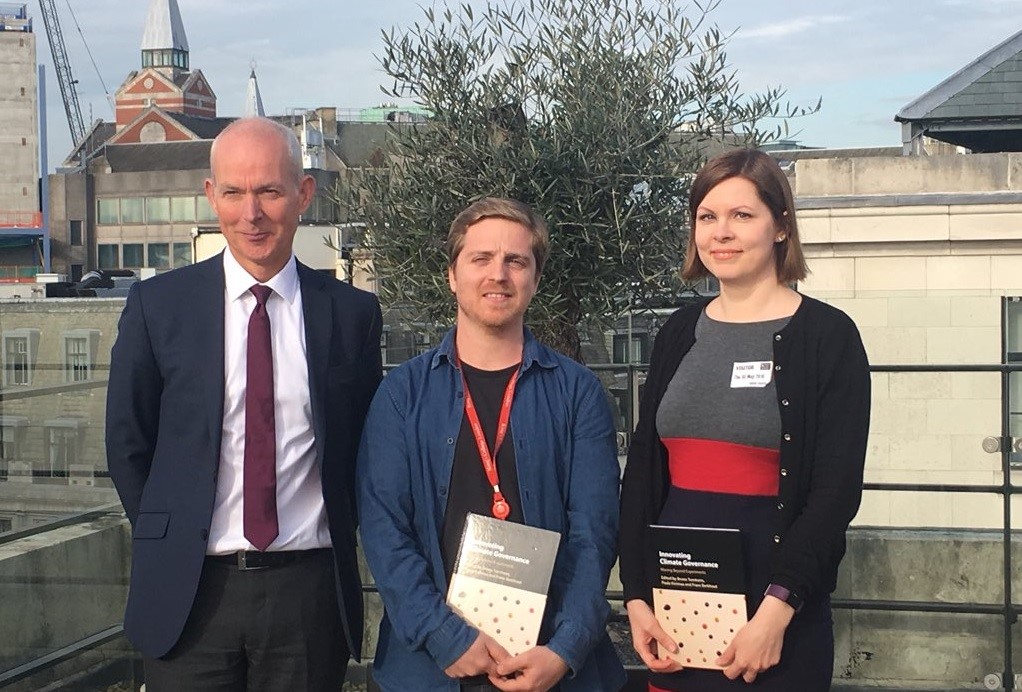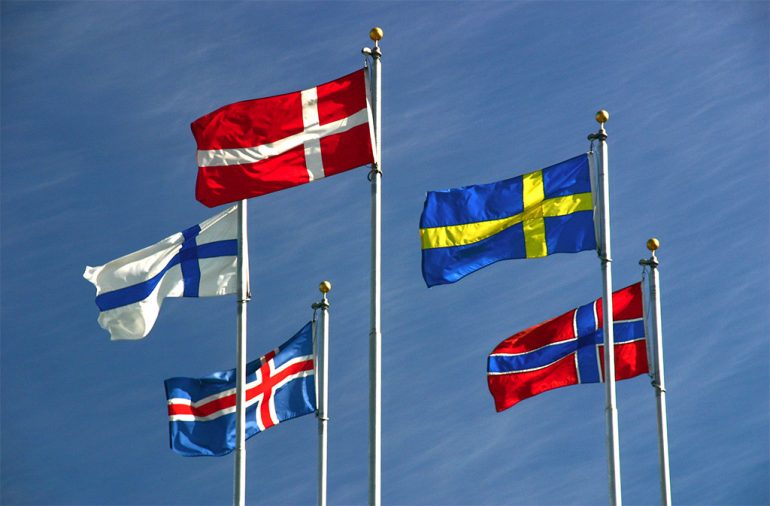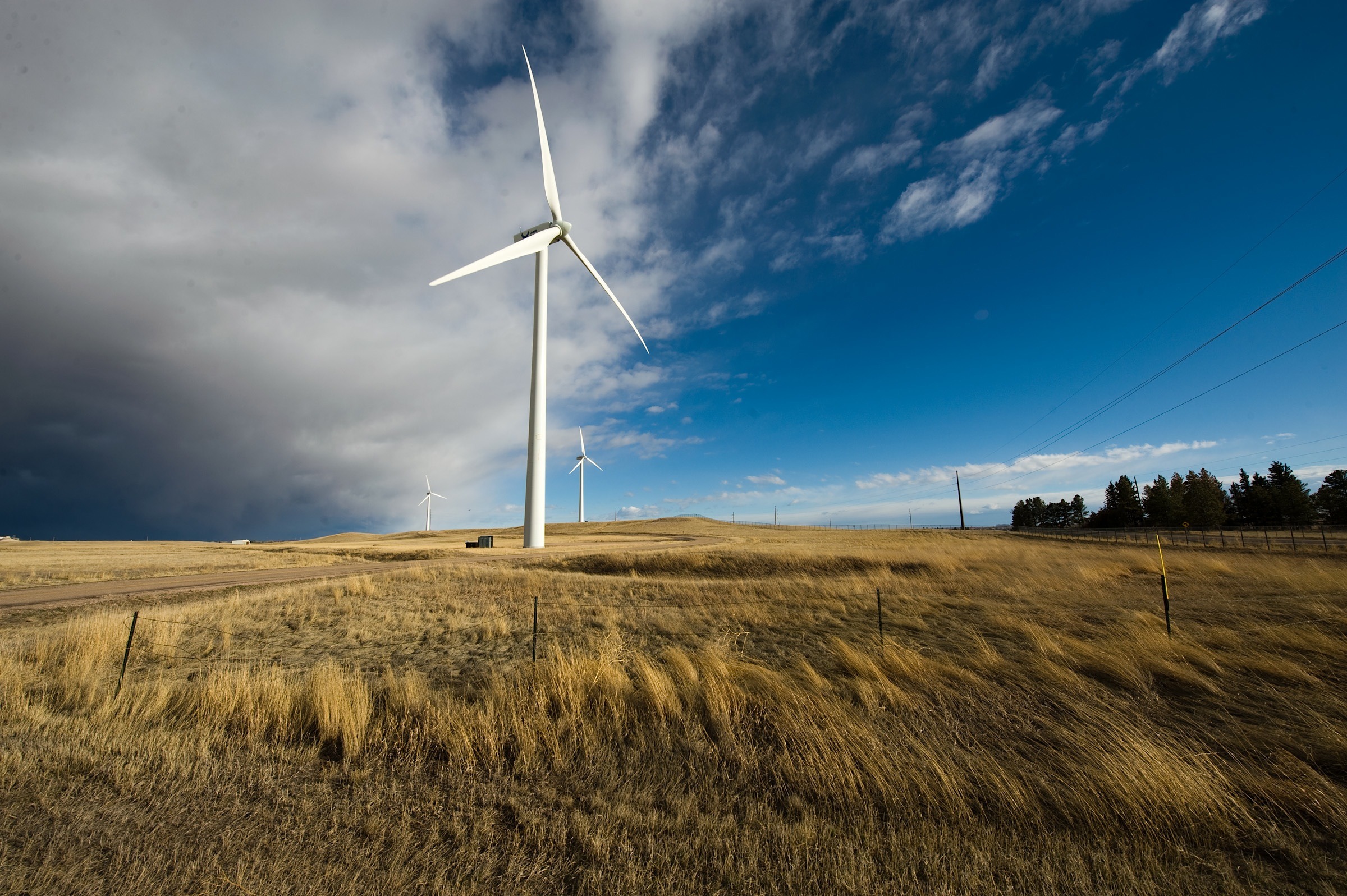
Highlights from the book launch by Nora Blascsok
In April 2016, the Science Policy Research Unit (SPRU) and the Centre on Innovation and Energy Demand (CIED) hosted a workshop titled ‘“Beyond experiments: Understanding how climate governance innovations become embedded”. The workshop, which I had helped organise, brought together 20 researchers from eight countries to discuss how experiments in climate governance impact society and how they can become embedded.
Almost exactly two years later, I got to hold the physical outcome of this workshop in my hands: a new book, edited by Bruno Turnheim, Paula Kivimaa and Frans Berkhout titled ‘Innovating Climate Governance: Moving Beyond Experiments”.
On 3 May 2018, people gathered to celebrate the launch of this book at Kings College London (KCL) on the 8th floor of Bush House, with a view of the sun setting over the city.
The event was introduced and chaired by Frans Berkhout, one of the book’s editors and Dean of the Faculty of Social Science and Public Policy at KCL, with presentations from the two other editors Bruno Turnheim and Paula Kivimaa, chapter contributor Helen Pallett (University of East Anglia) and guest speaker, Fred Steward (University of Westminster).
On my way to the book launch, I was thinking about experiments. The first thing that came to my mind was scientific experiments, typically used in testing out theories. However, an experiment can also mean much more than this. It can mean trying out something novel and building on the things we have learnt from it when going forward. We can see this kind of experimentation in today’s cities, trying out new, more sustainable ways of living, working, growing food or travelling for example. These experiments can often produce unexpected outcomes.
Bruno Turnheim, who introduced the context and the motivations behind the book, emphasised the emergence of local climate action, grassroots initiatives and living labs – with a growing interest in local initiatives around the world, following the Paris agreement.
The book looks at the concept of climate governance experiments from a policy context, not only as a research problem. It asks some important questions around whether experimentation is a legitimate new form of intervention, can it be effective and whether those regarding it as panacea are overly enthusiastic.
Dr Turnheim also highlighted the way in which, this book brings together different research disciplines and creates a dialogue, particularly between innovation and governance studies. Governance studies often address experiments in a top-down, orchestrated manner, and emphasise their increasing relevance with the failure of transnational climate action. Innovation studies, on the other hand, often describe experimentation as a messy and highly contested process. The main question they ask is how we embed experimentation in practice. This is also a key question the book tries to answer.
SPRU’s Paula Kivimaa took the stage next to present the conclusions of the book. She outlined the ways in which we can move beyond individual experiments and what the potential outcomes can be. According to her, experiments do not only lead to learning but this learning can serve as a template for future projects. In some cases, experiments can achieve systemic and transformative change, overturning regimes and leading to political change. However, she emphasised, that for experiments to have this broader influence, we need resources dedicated to experimentation and a specific framework for experimenting, including evaluation of the aggregated impacts of multiple experiments.
This book offers more than fifty empirical cases across different parts of the world, examining climate governance experiments in different contexts. One of the contributors, Dr Helen Pallett from the University of East Anglia, took the stage next, highlighting the role of citizen engagement and public dialogues in climate governance.
She pointed out that low carbon transition demands new ways of engaging with people and that we need to be experimenting in the face of new challenges. She concluded that the book offers an important contribution because it allows us to focus on the bigger picture rather than single cases, which helps to identify the connections, synergies and conflicts between the different experiences of experimentation.
Finally, Professor Fred Steward was invited to give his feedback on the book. He concluded that Innovating Climate Governance is an ambitious book mapping out what the concept of climate governance experiments means but also going beyond that. He highlighted the fact that climate goals are global, yet the means of achieving them have to focus on the local level.
I have certainly learnt a lot and was left with some big questions. How can we encourage local experimentation without making it a process imposed from the top-down? What are the ways in which we can best engage citizens in climate change? How do we connect people across the world working on these experiments and how do we measure their impact?
It is certainly a topic that stimulates a lot of debate. I hope that it will lead to meaningful action as well.
Follow Sussex Energy Group






